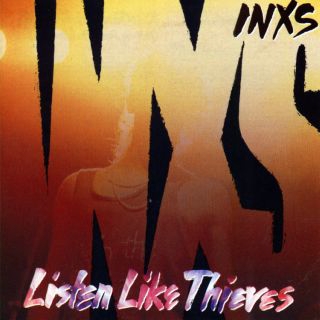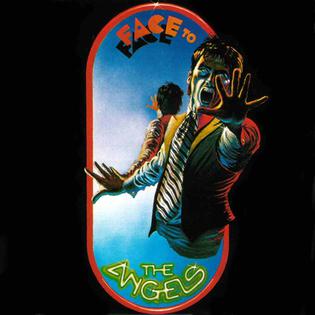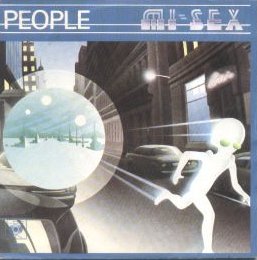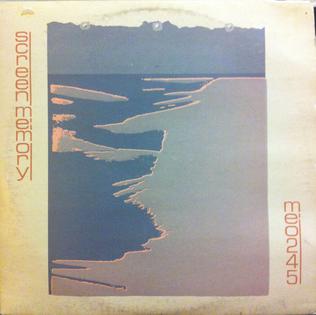
Listen Like Thieves is the fifth studio album by the Australian rock band INXS. It was released on 14 October 1985. It spent two weeks at number one on the Australian Kent Music Report Albums Chart. Considered an international breakthrough album for the band, it peaked at No. 11 on the United States Billboard 200, No. 24 on the Canadian RPM 100 Albums and top 50 in the United Kingdom.

"Computer Games" is a song by New Zealand band Mi-Sex, released in September 1979 in Australia and New Zealand as the second single from their debut studio album, Graffiti Crimes (1979). The song peaked at number 1 in Australia and 5 in New Zealand. The music video was filmed on location at what was at the time Control Data Corporation's North Sydney centre and included gameplay from the 1979 arcade games Speed Freak, Basketball and Star Fire. The single won the award for Best Australian Single at the 1979 TV Week/Countdown Music Awards.

INXSIVE is the first compilation album by Australian rock band INXS, which was released in 1982 on Deluxe Records for the Australian market only. It appeared in the top 100 of the Kent Music Report Albums Chart. INXSive features highlights from the band's first two studio albums, related B-sides, and two non-album singles: "Simple Simon" and "The Loved One". The latter is a cover of a 1966 single originally by The Loved Ones; INXS later re-recorded this song and released it on the album Kick.

Face to Face is the second studio album by Australian hard rock band, the Angels, which was released in June 1978. It was co-produced by the band with Mark Opitz, which peaked at No. 18 on the Kent Music Report Albums Chart. For shipment of 280,000 copies, it was accredited as 4× platinum.
Stephen Ellis Gilpin was a New Zealand singer and a founder of new wave band Mi-Sex.

Mi-Sex is a New Zealand new wave band originally active from 1978 to 1986, and led for much of its existence by Steve Gilpin as vocalist, Kevin Stanton as guitarist and songwriter, Murray Burns as keyboardist and songwriter, and Don Martin as bassist. The group's manager for much of its career was Bob Yates. Mi-Sex achieved two top 10 hit singles in 1979-80: "Computer Games" in October 1979 and "People" in 1980. Their first two albums both reached the New Zealand top 10, Graffiti Crimes and Space Race. They were known for their cutting edge production and dynamic live shows. Gilpin died in January 1992, two months after a serious car accident from which he never recovered. Mi-Sex have periodically reformed, including in 2011 with Steve Balbi (ex-Noiseworks) on lead vocals. Stanton died on 17 May 2017, Martin on 10 August 2020.
Company Caine, also styled as Co. Caine and Company Kane, were an Australian progressive rock band. They were formed in March 1970 by Ray Arnott on drums, Cliff Edwards on bass guitar (ex-Cam-Pact), Jeremy Noone on saxophone and keyboards, Gulliver Smith on lead vocals and Russell Smith on guitar and vocals (ex-Cam-Pact).
Machinations are an Australian synthpop band which formed in 1980. They reached the top 20 on the Kent Music Report albums chart with Big Music in 1985. Their top 30 hits on the related singles chart are "Pressure Sway", "No Say in It", "My Heart's On Fire" and "Do to You". By 1989 the group had disbanded. They briefly reunited in 1997 and then reformed in 2012.
Cheetah were an Australian hard rock band, active between 1976 and 1984.

Space Race is the second studio album by New Zealand New Wave music group Mi-Sex, released in May 1980.The album peaked at number one on the New Zealand albums chart and was certified platinum.
MEO 245 were an Australian new wave band which formed in 1978 in Hobart, Tasmania with Paul Brickhill on keyboards, guitar and vocals; Campbell Laird on drums; Paul Northam on guitar and vocals; and Mick Wilson on bass guitar. Wilson was replaced on bass guitar by Mark Kellett, who in turn was replaced by Anthony Moore. The group issued a sole studio album, Screen Memory, which reached the top 100 of the Kent Music Report Albums Chart.
Russell James Dunlop was an Australian musician, singer-songwriter and record producer-engineer. From the late 1970s he collaborated with Bruce Brown in a production company for albums and singles by Australian performers including Mental As Anything, The Reels and Machinations. As a musician he was a member of various groups such as Aesop's Fables (1968–70), Levi Smith's Clefs (1971), Southern Contemporary Rock Assembly (SCRA) (1971–72) and Ayers Rock (1976).
Mario Daniel Millo is an Australian musician and composer from Sydney, he was a member of symphonic rock group Sebastian Hardie from 1973 to their disbandment in 1977. Their debut album, Four Moments (1975) peaked at No. 13 on the Australian Kent Music Report Albums Chart. He has had a solo career and composed film and television soundtracks and scores. In 1978, he worked with Jon English on the soundtrack for the television series, Against the Wind and its related single, "Six Ribbons". Both album and single peaked in the Top 10 on the relevant Kent Music Report charts. The series had international release, known as Mot alla vindar/Mot alle vindar/Mod vinden (1980) in Scandinavian countries where the album and single reached No. 1 in Norway and No. 4 in Sweden. Millo's compositions have won Australian film industry awards for, The Lighthorsemen (1987) and television awards for, Brides of Christ (1991) and Changi (2001). Brides of Christ won an Australian Record Industry Association (ARIA) Music Award in 1992 for 'Best Original Soundtrack Album' - Millo was nominated for the same award in 1997 for G.P. and in 2002 for Changi.
Southern Contemporary Rock Assembly or SCRA was an Australian jazz-rock group formed in mid-1971 by Sheryl Black on lead vocals, Ian Bloxsom on percussion, Russell Dunlop on drums, Dave Ellis on bass guitar, Greg Foster on trombone and harmonica, Mickey Leyton on lead vocals, Jim Kelly on lead guitar, Mike Kenny on trumpet, Peter Martin on guitar and vocals and Don Wright on tenor sax and flute.
Girl Overboard were a pop rock band formed in 1985 as Separate Tables by Lisa Schouw a contralto on lead vocals, Robin Gist on guitar, and Brett McNaughton on keyboards with an expanded line-up, they changed their name. Girl Overboard released two albums: Paint a Picture and Go in 1993. The group split up in late 1993.

Where Do They Go? is the fourth studio album by New Zealand new wave band Mi-Sex, released in November 1983. The album peaked at number 80 on the Australian Kent Music Report. It would be the band's last studio album until Not from Here in 2016.

"People" is a song by New Zealand group Mi-Sex, released in March 1980 as the lead single from their second studio album, Space Race (1980). The song peaked at number 3 in New Zealand and 6 in Australia.

"Falling In and Out" is a song by New Zealand group Mi-Sex, released in April 1981 as the lead single from their third studio album, Shanghaied! (1981). The song peaked at number 48 in New Zealand and 20 in Australia.
"But You Don't Care" is a song by New Zealand group Mi-Sex, released in June 1979 as the lead single from their debut studio album, Graffiti Crimes (1979). The song was the band's first on CBS records and became the band's first charting single, peaking at number 33 in New Zealand and 25 in Australia.

Screen Memory is the first and only studio album by Australian new wave band MEO 245. The album peaked at No. 69 on the Kent Music Report Albums Chart. It was produced by Peter Dawkins, with Dave Marett as audio engineer, at Studios 301, Sydney. According to Australian musicologist, Ian McFarlane, "[the] title was taken from A Critical Dictionary of Psychoanalysis and the record itself was full of English-influenced pop rock." The album provided two singles, "Other Places" and "Jewels " (October). For Screen Memory MEO 245's line-up was Paul Brickhill on keyboards and vocals; Mark Kellett on bass guitar; Campbell Laird on drum kit; and Paul Northam on vocals and guitar.









